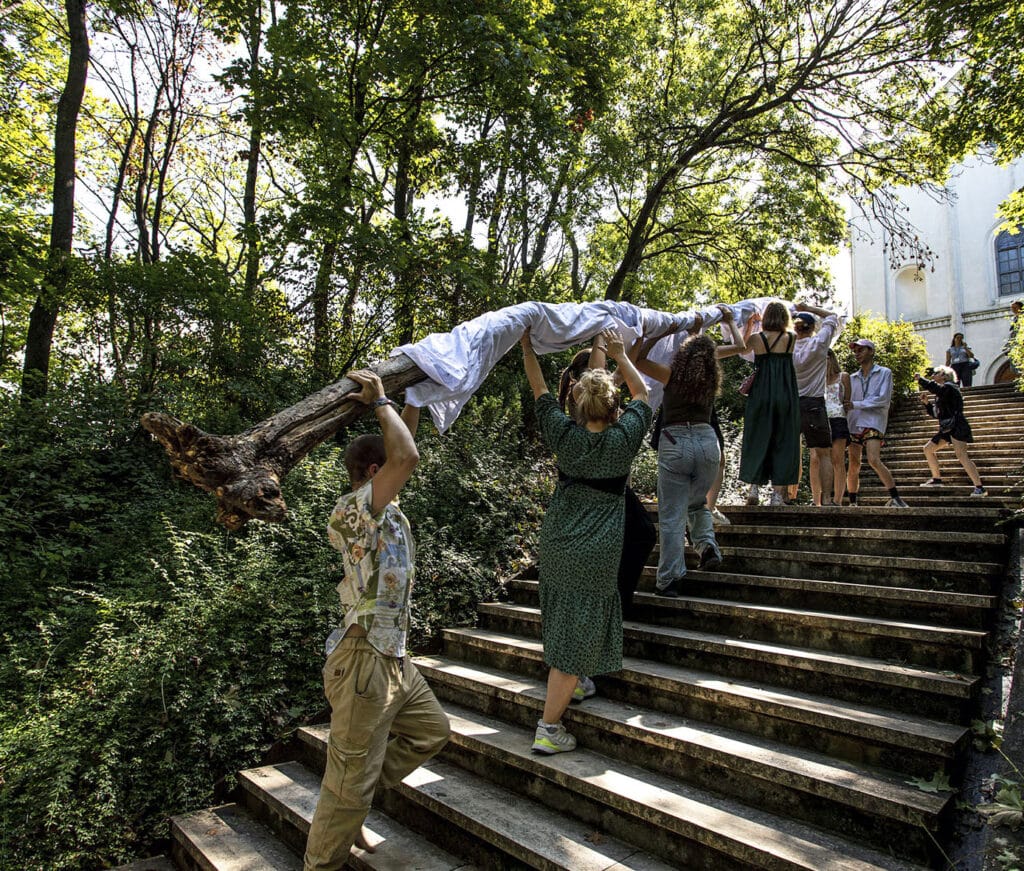The students of the Hungarian University of Fine Arts have been invited to the contemporary art festival Arcus Temporum, organized yearly around a specific motto by the Benedictine Abbey of Pannonhalma, in 2022. Although the festival is primarily focused on classical music and literature (the 2022 special guests were Péter Nádas and the Russian-American composer Lera Auerbach), in line with Abbey’s cultural program, contemporary visual art is also increasingly present in the three-day event. In addition to students from the University of Fine Arts, this year’s participants included three students from Riga and Dresden art universities. Two choreography and directing students from the University of Theatre and Film Arts were supported by the international team
The student’s project was also special because of its location: the rarely visited Chapel of the Assumption is the site of the mourning masses of the Benedictines and the crypt of the chapel is the burial place of the Benedictines. The theme of the festival, Renewal, was linked to a contemporary interpretation of the Virgin Mary, and in this context, the chamber exhibition “Mary, the world is renewed in your name” was held in the Chapel of the Assumption. Two paintings from this exhibition, a painting of Mary as a nine-months pregnant woman based on Holbein’s Dead Christ by Márta Czene and a symbolic Pietà photograph composed from found scenes by Boglárka Zellei, formed the starting point for the student project.
After a long preparatory work, the project was based on the tableau vivant, or live image, for which a choreography was prepared in advance and a performance cycle was created in a collective work, which was linked to the site and the motifs of the contemporary images of Mary on display, and which allegorically dealt with the psychological phases of mourning.
Csenge Gyopár Liksay, Flórián Takács, and Marcell Marosfalvi reflected on the call for renewal with live images of the Pieta and Noli me tangere (Don’t touch me) scenes. In relation to the theme, the live images explored the scenes of the Passion in which the presence of the woman is decisive. The works were not intended to be provocative, but simply to be unobtrusive and sophisticated in their attempt to represent the interpretation of the Bible from the perspective of women in church art.
The performance was dramaturgically wedged between the two live images. The central object was an eight-metre-long, withered trunk of a tree found on the site, fallen years ago, which the students wrapped in white sheets and lifted together. Then they set it up in front of the chapel, and the tree, like the hand of a sundial, stretched up to the sky in a silent movement that lasted what seemed like a minute and a half. This scene corresponded to the first phase of mourning, the denial. Then, with the bark-peeling, the balancing, holding and moving of the tree like a limbo, the other phases of mourning were represented. In the final image, the members of the group carrying the tree arrived in front of the Noli me tangere live image. They laid the trunk bench-like in front of the group of angels and the double of Jesus and Mary Magdalene, and then sat on it, making themselves spectators. This, the last image, the smoothing of the tree to the ground, its putting into use, was identified with the moment of letting go.
A less direct but all the more apt element of the Mourning performance cycle was Sina Neuberger’s complementary action, in which the figure lying on the ground appeared as a guiding arrow in the greenery of the grove surrounding the chapel, alongside the procession of wooden bearers ascending the stairs.
Live Pietà and Noli me tangere: Csenge Gyopár LIKSAY, Marcell MAROSFALVI, Ieva STALŠENE, Flórián TAKÁCS, Zoltán VISNYAI
Mourning performance cycle: BABINCHAK Atanáz, BEKE Zita, BURJÁN Vanda, Katrīna IEVA, KESZEGH Ágnes, KOLLER Margit, KOZMA Lilla, Sina NEUBERGER, PATAKI Luca, REGŐS Simon, REINING Vivien, SALAMON Júlia, SCHELL Réka, SZILÁK Andrea
